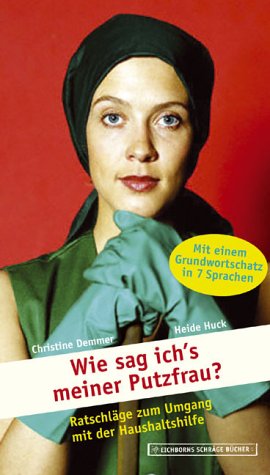
I haven’t actually seen this book, by Christine Demmer and Heide Huck, but it was mentioned on the TV news programme this lunchtime.
There is a recommendation (in German) on the Berliner Morgenpost site.
The book discusses how to offer praise and criticism, how to deal with special jobs and special payments, how to register the job with the authorities if necessary, and above all: a large glossary with the most important expressions and sentences in the seven most common languages spoken by many cleaning women in Germany.
I would like to know which languages, and what expressions are the ones you normally use to a cleaner.
By the way, I believe that is a non-Islamic headscarf.

Turkish, Byelarussian and Portuguese, for three.
Ah, a close reader.
I may need this. Not that my flat is in a suitable state to let a cleaner in.
Actually, I fear this book may not be as amusing as it sounds. Eichborn have some really good series of books, and also some eccentric ones. This is in a series called Schräge Bücher (Weird/eccentric books), which leads me to think there may be some ‘humour’ in it.
I’d be surprised if cleaning ladies in Germany spoke Byelorussian, since even citizens of Belarus generally have a hard time with it.
Is that Ruthenian, or is that dead?
Well, I will find out.
Let me try to guess: here in Fürth, it is most likely to be Turkish or Russian. Then there is Serbian/Croatian/Bosnian or whatever. Then come Italian and Greek, and probably Spanish. That’s six. There are a fair number of Portuguese here, with a Portuguese shop and Restaurant, but that may not be the seventh. It is going to be something southern, as they say. Arabic? The Ethnologue mentions Kurmanji, but I don’t know what that is.
Ruthenian is basically a West Ukrainian dialect (although for cultural reasons its speakers by and large prefer to consider themselves a separate people); according to Ethnologue there are 50,000 speakers.
Kurmanji is the main Kurdish language.
@hat: Thanks. So what am I not getting about Belarusian or Byelorussian – would they be more likely to speak Russian?
I read some survey (don’t you hate it when people don’t cite directly?) which alleged that 80% of those respondents who gave Byelorussian as their native language spoke only Russian at home. (The tendency in Russia, at least, where people are very aware of nationality/ethnicity, is to call a language your mother tongue even if you can’t sing a song in it, so long as it matches what’s printed in your passport.) I’ve never met anyone from Belarus who could speak Byelarussian. (I’m a little late getting back to this, sorry.)
@PF: no urgency, in that the comments on this site are normally late. Thanks for the information.
I have got the book now, but no time to blog it. The languages are English, French, Polish, Portuguese, Russian, Serbo-Croat and Turkish.
I should have thought of Polish, and English is very commonly used among people who don’t speak German. French is an odd choice, though.